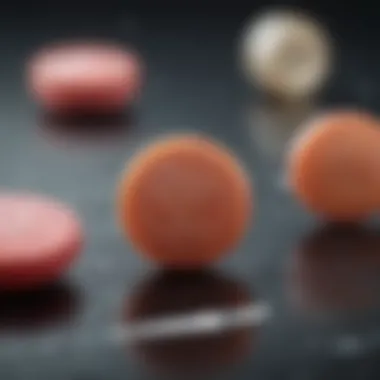Antibiotics and Cold Sores: An In-depth Analysis


Intro
Cold sores represent a common viral outbreak that many individuals encounter at some point in their lives. Primarily caused by the herpes simplex virus type 1 (HSV-1), these lesions can cause discomfort and social anxiety. For those affected, the search for effective treatments often extends to antibiotics, which raises significant questions regarding their role in managing viral infections.
Unlike bacterial infections, cold sores are rooted in viral activity. This distinction is vital. Antibiotics are designed to combat bacterial pathogens and do not have efficacy against viruses. Thus, using antibiotics for cold sores can lead to misconceptions about their effectiveness and might also contribute to antibiotic resistance.
The aim of this article is to clarify several misconceptions about the treatment of cold sores, specifically addressing the role of antibiotics. Furthermore, it will provide insights into available alternative treatments that are more suitable for managing symptoms associated with the herpes simplex virus.
By understanding the nature of cold sores and the limitations of antibiotics, health-conscious individuals can better navigate their treatment options and make informed health decisions.
Key Takeaways
- Cold sores are caused by the herpes simplex virus, primarily type 1.
- Antibiotics are ineffective against viral infections like cold sores.
- Alternatives for treatment include antiviral medications and topical creams.
- Consulting healthcare professionals is crucial for appropriate treatment options.
Understanding Cold Sores and the Role of Antibiotics
Cold sores primarily present as fluid-filled blisters around the mouth and lips. The herpes simplex virus can remain dormant in the body and may reactivate due to stress, illness, or other triggers. This reactivation leads to the familiar outbreaks that many individuals experience.
Antibiotics such as amoxicillin and azithromycin are not effective against HSV-1. These medications target bacterial infections and have no impact on viral replication. A critical understanding of this fundamental difference assists in avoiding the misuse of antibiotics, which can contribute to broader public health issues.
"Antibiotics cannot treat viral infections like cold sores. Their ineffective use can lead to complications like antibiotic resistance."
Individuals experiencing cold sores should consider more targeted treatments. Antiviral medications like acyclovir can significantly reduce the duration and severity of outbreaks. Over-the-counter topical creams also exist, which can alleviate symptoms.
In-Depth Analysis
The relationship between antibiotics and viral infections is a critical topic in modern healthcare. Scientific studies have consistently demonstrated that antibiotics do not work against viral pathogens. For instance, research published in the Journal of Antimicrobial Chemotherapy emphasizes that indiscriminate use of antibiotics can lead to bacterial resistance, diminishing their efficacy when truly needed.
In practice, if a person has recurrent cold sores, they might be advised to keep track of outbreaks and identify triggers. Maintaining a healthy immune system plays a role in reducing the frequency of outbreaks. Nutrition, sleep, and stress management are essential components of this strategy.
Health professionals often recommend ensuring that patients are aware of the mechanisms behind cold sores and the ineffectiveness of antibiotics. This clear communication fosters trust and promotes responsible health choices. By evaluating alternative treatments such as antiviral drugs, or topical therapies, individuals can find appropriate methods to manage their symptoms effectively.
Understanding Cold Sores
Understanding cold sores is essential in the context of this article. It provides a foundation for discussing their connection with antibiotics, virus types, and effective treatments. By grasping what cold sores are, readers can take more informed steps regarding their health. Cold sores, caused predominantly by the herpes simplex virus, can have significant emotional and physical impacts. Recognizing the nuances and attributes of these sores allows for better management and treatment strategies. Knowledge of cold sores is particularly relevant for healthcare professionals, wellness coaches, nutritionists, fitness trainers, and mindfulness instructors. They often guide clients through understanding illness and managing symptoms.
Overview of Cold Sores
Cold sores, or fever blisters, manifest as small, painful blisters around the lips or mouth. They are primarily caused by the herpes simplex virus, specifically type 1, although type 2 can also be responsible. Cold sores usually appear as clusters of small blisters, often resulting in itching and discomfort. It is important to note that these lesions are highly contagious, often spreading through close contact.
Cold sores often begin with a tingling or burning sensation before progressing to visible blisters. These sores typically last a week or two, with the healing process including crusting over and eventually scabbing. While they are not life-threatening, their recurrent nature can be distressing, impacting a person’s quality of life.
Causes of Cold Sores
The primary cause of cold sores is infection with the herpes simplex virus. This virus can remain dormant in the body and become reactivated due to various triggers. Common causes include:
- Stress: Emotional or physical stress can weaken the immune system, prompting outbreaks.
- Illness: Other infections or illness can make an individual more susceptible to cold sores.
- Hormonal Changes: Fluctuations in hormones, such as those during menstruation, can trigger outbreaks.
- Sunlight Exposure: Excessive sun exposure can irritate the skin, leading to potentially painful outbreaks.
In some cases, cold sores can also develop after skin trauma, such as a burn or cut. Understanding these triggers is crucial for prevention and management strategies.
Symptoms and Progression
Recognizing the symptoms of cold sores early can aid in management. Initially, symptoms often manifest as:
- Tingling or burning sensation before blisters appear.
- Small, painful blisters that usually form on or around the lips.
- Crusting and scabbing of the blisters as they heal.


The progression typically follows a pattern. After the initial tingling phase, blisters form, which then burst and ooze fluid. This fluid can spread the virus to other areas of the mouth or even to other individuals through direct contact. The entire cycle can take about one to two weeks.
lThough not life-threatening, the recurring nature of cold sores can lead to significant emotional distress. Managing symptoms effectively is therefore essential for overall well-being.
The Herpes Simplex Virus
The understanding of the herpes simplex virus plays a crucial role in this article, particularly when discussing cold sores. This virus is the primary causative agent of cold sores, commonly presenting as painful blisters around the lips and mouth. Recognizing its characteristics helps in grasping why certain treatments like antibiotics are ineffective. Furthermore, it sheds light on the nature of this viral infection, which directly impacts treatment options and recurrence.
Types of Herpes Simplex Virus
There are two main types of herpes simplex virus: HSV-1 and HSV-2.
- HSV-1 is primarily associated with oral herpes, which includes cold sores. It is highly contagious and spreads easily through direct contact with infected individuals, often during childhood.
- HSV-2, on the other hand, is typically linked to genital herpes. This type usually spreads through sexual contact.
While the two types can be transmitted through oral and genital routes, their implications and the areas of the body they affect vary significantly.
Transmission and Contagion
Transmission of the herpes simplex virus occurs via direct skin-to-skin contact with an infected person. This can happen even if the infected individual shows no visible symptoms. It is crucial to recognize common transmission routes:
- Kissing or close physical contact with an infected person can lead to HSV-1 transmission.
- Sexual activity, including oral sex, can facilitate the transmission of both HSV-1 and HSV-2.
- Sharing utensils, razors, or lip balm can also pose a risk, although this is less common.
Understanding these transmission methods emphasizes the importance of preventive measures to avoid outbreaks and reduce spread, notably among those who are aware of their condition.
Immune Response and Recurrence
The immune system plays a vital role in managing cold sore outbreaks caused by herpes simplex virus. Upon initial exposure, the body mounts an immune response to fight off the virus. However, HSV can establish latency in nerve cells, allowing it to remain dormant until reactivation triggers an outbreak. Factors that may contribute to recurrence include:
- Stress
- Illness or fever
- Hormonal changes
- Sun exposure
A robust immune response generally reduces the frequency and severity of outbreaks. Those suffering from frequent recurrences may benefit from antiviral medications which can help manage and suppress the virus effectively.
"Understanding the herpes simplex virus helps clarify the ineffectiveness of antibiotics against cold sores, guiding better treatment choices."
By examining the intricacies of the herpes simplex virus, individuals can make informed health decisions regarding prevention, treatment, and management strategies relating to cold sore outbreaks.
The Role of Antibiotics
Understanding the role of antibiotics in the context of cold sores is essential for health professionals and individuals seeking clarity on this common health issue. Antibiotics are powerful medications that effectively fight bacterial infections, but their application in viral infections, such as those caused by the herpes simplex virus, is limited. This section aims to clarify the important distinctions, benefits, and considerations related to antibiotics and their relevance to cold sore treatment.
What are Antibiotics?
Antibiotics are compounds that either kill bacteria or inhibit their growth. These medications can be classified into two main categories: bactericidal and bacteriostatic. Bactericidal antibiotics destroy bacteria directly, while bacteriostatic antibiotics stop bacteria from multiplying, allowing the immune system to eliminate the pathogens.
Some widely known antibiotics include:
- Penicillin: Often used for respiratory infections.
- Amoxicillin: Commonly prescribed for ear infections.
- Ciprofloxacin: Effective against various infections, including those from bacteria resistant to other antibiotics.
Antibiotics are crucial in treating bacterial infections. Their use, however, is not applicable for viral infections, making their role in conditions like cold sores negligible.
Mechanism of Action
The mechanism of action for antibiotics can vary significantly depending on their classification. Generally, they function by targeting specific features in bacterial cells that are absent in human cells.
Some key actions include:
- Inhibition of cell wall synthesis: Antibiotics like penicillin disrupt the formation of bacterial cell walls, leading to cell lysis.
- Inhibition of protein synthesis: Many antibiotics interfere with bacterial ribosomes, preventing them from producing essential proteins.
- Inhibition of nucleic acid synthesis: Certain antibiotics block pathways that bacteria use to synthesize DNA and RNA, halting replication.


It is crucial to note that these mechanisms are specifically effective against bacteria and do not impact viruses like herpes simplex, which is the primary cause of cold sores.
Overall, the misunderstanding of how antibiotics function can lead to inappropriate prescriptions, contributing to issues like antibiotic resistance. Therefore, understanding the role of antibiotics in treating infections is vital for effective medical practice, especially for health-conscious individuals who might consider alternative treatment options for managing cold sores.
Antibiotics vs. Viral Infections
The distinction between antibiotics and viral infections is crucial in understanding why antibiotics are generally ineffective against conditions like cold sores. While antibiotics are widely used to treat bacterial infections, they hold no power over viral pathogens such as the herpes simplex virus, which causes cold sores. This article section will thoroughly explain these differences and why they matter in medical practice and treatment planning.
Differences between Bacterial and Viral Infections
Bacterial infections and viral infections are fundamentally different in their structures and modes of action. Here are key differences:
- Structure: Bacteria are single-celled organisms. They can grow and reproduce independently. Viruses, on the other hand, are much smaller. They cannot reproduce without invading a host cell and hijacking its machinery to replicate.
- Cellular Composition: Bacteria contain all the necessary equipment for metabolism and reproduction. They have cell walls, membranes, and a full array of organelles. Viruses lack these cellular components; they consist of a protein coat and genetic material, either DNA or RNA.
- Treatment: Antibiotics are designed to target specific bacterial processes, such as cell wall synthesis or protein production. This targeting is why antibiotics can clear bacterial infections effectively. In contrast, there are no antibiotics available that can disrupt the life cycle of viruses.
- Disease Examples: Bacterial infections can lead to conditions such as strep throat or bacterial pneumonia, while viral infections can cause diseases like the common cold and cold sores.
Understanding these differences is essential for health professionals as they devise treatment plans. Misapplication of antibiotics to viral infections can lead to complications including antibiotic resistance and adverse side effects.
Why Antibiotics are Ineffective for Cold Sores
Cold sores are caused by the herpes simplex virus, which is a viral infection. Given this, the application of antibiotics is not only unnecessary but also ineffective. Here are some reasons:
- Target Mechanism: As mentioned, antibiotics target the cellular processes of bacteria. Since viruses do not possess these structures, antibiotics cannot disrupt their replication or function.
- Focus of Treatment: Cold sores typically heal on their own within one to two weeks. The use of antibiotics in such cases does not provide any added benefit, as it offers no impact on the herpes virus that causes the sores.
- Potential For Misuse: Prescribing antibiotics for a viral condition can lead to misuse and contribute to antibiotic resistance. This can complicate the treatment of subsequent bacterial infections, resulting in a larger public health issue.
"Administering antibiotics for a viral infection such as cold sores is not only futile; it also poses a risk to antibiotic efficacy in treating future bacterial infections."
For further insights, consider referring to reliable sources such as Wikipedia, Britannica or health forums like Reddit.
Alternative Treatments for Cold Sores
Cold sores can cause significant discomfort, leading many to seek effective treatments beyond antibiotics. Understanding alternative treatments is vital for managing symptoms and reducing the frequency of outbreaks. This section aims to explore these options, focusing on antiviral medications, home remedies, and preventive measures to provide a well-rounded approach to treatment.
Antiviral Medications
Antiviral medications are often the primary pharmaceutical approach for treating cold sores. Unlike antibiotics, these medications specifically target viral infections, making them appropriate for herpes simplex virus. Common antiviral drugs include Acyclovir, Valacyclovir, and Famciclovir.
These medications can help by:
- Reducing the duration of outbreaks: When taken at the first sign of a cold sore, antiviral medications can shorten the length of the outbreak.
- Decreasing the frequency of recurrences: For those who experience frequent outbreaks, daily antiviral medication can reduce the number of occurrences.
- Lessening symptoms: These drugs can alleviate pain and discomfort associated with active cold sores, promoting quicker healing.
Healthcare providers should evaluate patient history when prescribing these medications. Beyond effectiveness, potential side effects and interactions with other drugs must be taken into account.
Home Remedies
While clinical treatments are effective, many individuals prefer home remedies for managing cold sores. These remedies can complement antiviral medications or serve as standalone options in milder cases. Popular home remedies include:
- Lysine: An amino acid that may reduce the severity and frequency of cold sores.
- Lemon balm cream: Applied topically, it is thought to have antiviral properties and can soothe outbreaks.
- Aloe vera: Known for its skin-soothing properties, it may help speed healing and reduce inflammation.
- Ice or cold compress: Applying a cold compress can alleviate pain and reduce swelling during an outbreak.
While these remedies may provide symptomatic relief, they do not replace clinical treatments. Individuals should remain cautious, as effectiveness can vary widely, and not all remedies are supported by robust scientific evidence.
Preventive Measures
Preventing cold sores is as important as treating them. Certain lifestyle adjustments can minimize the risk and frequency of outbreaks. Effective preventive measures include:
- Avoiding known triggers: Stress, illness, and sun exposure can lead to outbreaks. Identifying and managing these triggers can be helpful.
- Maintaining good hygiene: Regular handwashing and avoiding skin-to-skin contact during outbreaks reduce the risk of spreading the virus.
- Using lip balm with SPF: Protecting the lips from sunburn can help lower the risk of cold sore outbreaks that result from UV exposure.
- Managing stress: Techniques such as meditation, exercise, and adequate sleep can enhance the immune system and lower the chances of an outbreak.
In summary, alternative treatments for cold sores encompass a variety of strategies including antiviral medications, home remedies, and preventive measures. Understanding each option allows individuals to attain better control over their symptoms and improve their health outcomes.


Consulting Healthcare Professionals
Consulting healthcare professionals is critical when addressing cold sores. This is especially true because many people may misinterpret the symptoms or assume they can self-treat effectively. Professionals bring invaluable expertise to the discussion, offering credibility and tailored guidance that’s indispensable for optimal health management.
When to Seek Medical Advice
It is wise to seek medical advice if cold sores are frequent or unusually severe. Some indicators include:
- Frequent Recurrences: If cold sores appear more than twice a year, a consultation may be necessary.
- Severe Symptoms: Intense pain or discomfort that doesn't subside with standard over-the-counter treatments is another red flag.
- Complications: Symptoms such as fever, swollen lymph nodes, or widespread rash often indicate a need for professional intervention.
"Seeing a healthcare professional can save time and reduce the emotional burden often associated with recurrent cold sores."
Healthcare providers can help distinguish between cold sores and other conditions that may mimic their appearance, such as allergic reactions or other viral infections. This distinction is vital for appropriate management.
Understanding Treatment Options
Healthcare professionals assess individual cases to outline suitable treatment options, which may include:
- Antiviral Medications: Drugs like acyclovir or valacyclovir are typically recommended to lessen the duration and severity of outbreaks.
- Topical Treatments: Creams or ointments may be used to soothe symptoms and speed up healing.
- Preventive Therapies: For individuals experiencing frequent outbreaks, preventive medication can be discussed to reduce the frequency of occurrences.
Knowing when to consult and understanding treatment options can empower individuals to manage their health effectively. It promotes an informed dialogue between patients and healthcare providers, ensuring a more personalized and efficient care pathway.
Managing Cold Sores Effectively
Managing cold sores effectively is crucial for individuals who suffer from this common viral condition. Cold sores, caused by the herpes simplex virus, can significantly affect a person's quality of life due to pain, embarrassment, and recurrent outbreaks. This section will delve into key strategies for managing these sores, focusing on the importance of maintaining good hygiene and implementing lifestyle modifications. Both elements contribute to not only reducing the frequency of outbreaks but also to alleviating symptoms when they do occur.
Maintaining Good Hygiene
Good hygiene practices are essential in managing cold sores. These practices help minimize the risk of spreading the virus and can reduce the severity and duration of outbreaks. Here are key hygiene tips:
- Keep the Affected Area Clean: Regular cleansing of cold sore areas with mild soap and water prevents secondary infections.
- Avoid Touching: Resist the urge to touch or pick at the cold sore. This can worsen the irritation and further spread the virus.
- Wash Hands Frequently: Always wash hands thoroughly after touching the face or any sores. Using soap and water for at least 20 seconds is ideal, especially after touching other surfaces.
- Use Personal Items: Do not share towels, razors, or utensils. These items can facilitate the transfer of the virus.
- Apply Topical Treatments Carefully: When using creams or ointments for cold sores, apply with clean fingers or a cotton swab to avoid contamination.
Maintaining this level of hygiene not only helps in containing the virus but also encourages quicker healing of the sores.
Lifestyle Modifications
In addition to hygiene, lifestyle modifications play a significant role in managing cold sores. By making conscious changes to daily habits and routines, individuals can help reduce the incidence and intensity of outbreaks. Consider these lifestyle adjustments:
- Stress Management: High stress levels can weaken the immune system and trigger outbreaks. Adopting relaxation techniques such as yoga, meditation, or deep breathing exercises can be beneficial.
- Balanced Diet: Eating a diet rich in vitamins and minerals supports overall health. Foods high in vitamin C and B vitamins may boost immunity, potentially decreasing the frequency of outbreaks.
- Adequate Rest: Sufficient sleep is vital for maintaining a healthy immune response. Aim for 7-9 hours of good sleep per night.
- Avoiding Triggers: Identify personal triggers that may lead to outbreaks. For some, these triggers might include excessive sun exposure or illness. Taking preventive measures, such as wearing lip balm with sunblock, can help.
- Hydration: Staying well-hydrated is important for skin health and can enhance the healing process of cold sores.
These modifications not only foster personal well-being but also create a proactive approach to handling cold sores.
It's important to remember that proactive management strategies can significantly impact the frequency and severity of cold sore outbreaks.
By integrating good hygiene practices with thoughtful lifestyle choices, individuals can effectively manage and mitigate the impact of cold sores on their daily lives.
The Future of Cold Sore Treatment
Cold sores are a prevalent condition, and understanding their future treatment is crucial for patients and healthcare providers alike. The role of research and innovation in developing new therapies cannot be overstated. As the understanding of the herpes simplex virus advances, so does the potential for more effective treatments. Researchers are focusing on various aspects, including vaccine development, targeted therapies, and advanced antiviral medications. Each of these areas holds the promise of offering better management options for these painful outbreaks.
Ongoing Research on Herpes Treatments
Current research efforts target several areas relevant to herpes treatment. One significant focus is the exploration of vaccines that could provide immunity against the herpes simplex virus. Initial studies show promise, as some vaccine candidates have demonstrated an ability to reduce the frequency and severity of outbreaks. Ongoing trials aim to fine-tune these vaccines for broader efficacy.
Moreover, researchers investigate novel antiviral agents that can inhibit viral replication more effectively than existing medications. This involves examining how these agents affect the viral lifecycle at cellular levels. By understanding the biology of the virus better, scientists can develop drugs that directly disrupt its ability to spread. Additionally, combination therapies are being explored, where existing antiviral drugs are used in tandem with new agents to enhance overall effectiveness.
Advancements in Antiviral Therapy
Recent advancements in antiviral therapy specifically designed for treating cold sores have shown encouraging results. Researchers are delving deep into genetic pathways that the herpes virus utilizes to replicate. This investigation opens pathways to create more targeted therapies. For example, some new medications are engineered to inhibit specific enzymes critical for the virus's lifecycle.
Furthermore, there is an ongoing effort to improve delivery methods for antiviral drugs. Topical treatments are being optimized for better absorption and quicker action. Oral medications are also taking a new shape, with extended-release formulations that allow a longer duration of action, reducing the frequency of dosages required.
The landscape of cold sore treatment is changing. With continued research and development, new antiviral treatments hold the potential to not only alleviate symptoms but also reduce recurrence rates. As these advancements unfold, it is essential for healthcare professionals to stay informed and consider integrating new therapies into their treatment protocols.







